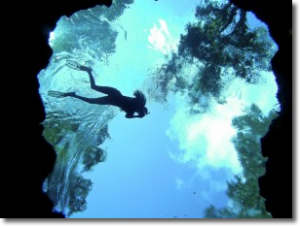Clean Coastal and Ocean Waters
Significant impacts to water quality and coastal ecosystem health are predicted as a result of population growth and land use change, increasing urbanization, point and non‐point source pollution, and climate change. The Alliance will undertake activities to:
- Enable coastal managers and decision‐makers to predict, prevent, enforce, respond, and mitigate ecosystem and human health impacts; and
- Provide consistent data through integrated coastal and ocean observing and monitoring system.

Coastal Wetlands Monitoring
Monitoring the coastal wetlands of North Carolina, South Carolina, Georgia, and Florida is necessary to understand the current extent, condition, and function of these important natural resources and to begin to predict how these ecosystems will respond to changes in land use, climate, sea level, and water quality. Currently, there is no standardized or widely accepted monitoring program within these South Atlantic states. Instead, various federal, state, and local agencies, in addition to universities and nongovernmental organizations, are monitoring different aspects of coastal wetlands and their associated waters. However, there is little coordination among these agencies and organizations and there is limited sharing of data and information and leveraging of resources. With support from RTI International, the CCOW is addressing these challenges through a Coastal Wetlands Monitoring Workgroup.
The workgroup’s final report and recommendations are now available, including access to the Coastal Wetlands Monitoring Data Catalog.
The Coastal Wetlands Monitoring Data Catalog provides a centralized location to access information about coastal wetland monitoring programs and station information in North Carolina, South Carolina, Georgia, and Florida (Atlantic Coast). The user-friendly interface allows the user to explore the different coastal wetlands monitoring programs and identifies where to find the monitoring data. The database contains over 700 monitoring stations from 34 monitoring programs of 19 organizations. While the focus was on coastal wetlands, stations throughout the project area were included in the database as were non-wetlands stations for monitoring nearby surface waters, atmospheric conditions, and oyster reefs.
Access the Database: Coastal Wetlands Monitoring Data Catalog (ZIP file)
The report on Coastal Wetlands Monitoring in the Southeast U.S. assesses the monitoring methods employed across the region. The compilation of the methods contained within this report serves as the starting point for developing regional monitoring guidelines. Many coastal wetlands monitoring programs are either short term (1 to 2 years) or are just in their infancy. The final section of this report identifies the opportunities and obstacles for the next step in developing regional monitoring guidelines.
Access the Report: Coastal Wetlands Monitoring in the Southeast U.S.
GSAA Coastal Water Quality Best Management Practices Compendium
The Coastal Water Quality Best Management Practices Compendium (updated 04/26/16) is offered as a resource for those professionals whose work involves land-based activities that contribute to nonpoint source pollution, particularly in the southeastern U.S. coastal region. These resources were compiled by members of the Clean Coastal and Ocean Waters Watershed Implementation Workgroup of the Governors’ South Atlantic Alliance. This workgroup consists of representatives from Florida, Georgia, South Carolina, and North Carolina. Many of the BMP manuals in this document are referred to in the regulations of the respective states. Other resources are meant to include the most useful practices for each nonpoint source category as listed in the tabs. Bookmarks to BMPs for each individual category can be viewed when the compendium is opened with Internet Explorer. When the compendium is opened, right click, and then select ‘Show Navigation Pane Button’.
Coastal Watershed Planning Curriculum
Based on the Water Quality Best Management Practices Compendium, Moffatt and Nichol and the North Carolina Coastal Federation (NCCF) collaborated to prepare a Watershed Planning Curriculum that provides a framework for local communities to implement the BMPs highlighted by the states. NCCF led a train-the-trainer session in April 2016 and each state held a custom training with the components of the curriculum that were most relevant to their goals for water quality and watershed management and low impact development.
Prioritized Actions for 2014
- CCOW 1A – Establish a regional technical level work group for the purpose of sharing watershed water quality improvement processes.
- CCOW 1B – Improve the ability to model loading coefficients for point and nonpoint sources of nitrogen in coastal ecosystems using the best available technology and information including climate change information.
- CCOW 1C – Develop recommendations on processes & protocols to transfer knowledge/implement BMPs for point & non-point source controls, and to encourage smart growth and green infrastructure.
- CCOW 2A – Develop Interactive map-based assessment tool(s) to support climate change mitigation and adaptation strategies.
- CCOW 3A – Establish a regional level monitoring workgroup to address compatibility among states.
CCOW Snap Shots
CCOW1A Clean Water Act CCOW2A Water Quality Data CCOW3A Regional Compatibility
Prioritized Actions for 2013
- CCOW1A – Establish a regional technical level work group for the purpose of sharing watershed water quality improvement processes.
- CCOW1C – Develop recommendations on processes and protocols to transfer knowledge/implement BMPs for point and non-point source controls, and to encourage smart growth and green infrastructure (including monitoring-based performance measures). Potential focus is TMDLs.
TECHNICAL TEAM
STATE REPRESENTATIVES
Cyndi Karoly– NC Dept. of Environment and Natural Resources
David Wilson – SC Department of Health & Environmental Control
Kelly Hill – GA Dept. of Natural Resource
Gary Raulerson (Team Lead) – FL Department of Environmental Protection
FEDERAL REPRESENTATIVES
Drew Kendall – Environmental Protection Agency
C. Anna Toline – Dept. of the Interior/U.S. National Park Service
Elden Gatwood – U.S. Dept. of Defense/U.S. Army Corps of EngineersADDITIONAL MEMBERS
David Graves – SC Department of Health & Environmental Control
Sean Torrens – SC Department of Health & Environmental Control
Andrea Small – FL Dept. of Environmental Protection
Mathew Kimball – FL Dept. of Environmental ProtectionWATERSHED IMPROVEMENT WORKING GROUP
Adriene Weaver – NC Dept. of Environment and Natural Resources
Andy Miller – SC Department of Health & Environmental Control
Keren Giovengo – University of Georgia
Michael Thomas – FL Dept. of Environmental Protection
